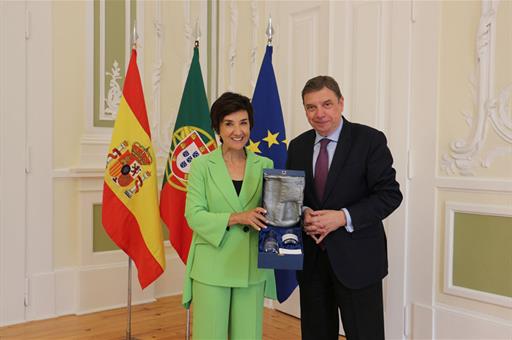Spain and Portugal agree to ask the European Commission to adopt urgent drought measures
News - 2023.5.24
These include the urgent activation of the Common Agricultural Policy (CAP) crisis reserve fund and an increase in advance payments up to the maximum legally permitted, so that farmers and stockbreeders have more resources to mitigate the consequences of the lack of water on their farms.
This was agreed by the Minister for Agriculture, Fisheries and Food, Luis Planas, and his Portuguese counterpart, Maria do Céu Antunes, at the bilateral meeting they held today in Lisbon. Both have agreed to express this need with one voice, given how the severe drought is ravaging the Iberian Peninsula, at the next Council of Ministers of Agriculture and Fisheries of the European Union (EU).
The two countries, together with the support of France and Italy, will express to the European Commission (EC) at the next Council meeting on 30 May the need to activate all necessary measures in the face of a European problem caused by drought.
Luis Planas highlighted the "magnificent relations" between Spain and Portugal, which are key, because "both share the same territory, they have to face similar problems and, together, they will defend before the European Commission the activation of urgent measures to help farmers and stockbreeders".
Minister Antunes valued the minister's visit, in view of the upcoming presidency of the Council of the European Union, and in order for them to collaborate in the search for common solutions to tackle climate change, especially the effects of drought. This type of meeting between "two countries so close to each other is very important, cooperation acquires a strategic character for Spain and Portugal, united by much more than just a border", he stressed.
The minister recalled that on 24 April he sent a letter to the Commissioner for Agriculture, Janusz Wojciechowski, in which he asked the European Commission (EC) to establish urgent measures to alleviate the drought situation. This initiative also has the backing of France, as Minister Marc Fesneau confirmed a few days after it was sent to Luis Planas in another bilateral meeting held in Paris at the end of last month.
Food security in the current climate change scenario and monitoring the situation of agricultural and livestock markets due to the war in Ukraine were the priorities recently set by the agriculture ministers of Spain, Belgium and Hungary at the meeting they held to prepare a common programme as a trio for the next presidencies of the EU Council between 1 July and 31 December 2024.
The current climatic conditions have caused serious damage to agriculture and livestock farming in the Iberian Peninsula and also in other EU countries. Climate change has resulted in severely reduced rainfall, record high temperatures in April, and torrential rains and hail events that have also taken their toll on outdoor production and pastures. In Spain and Portugal, the rainfed crops and extensive livestock farming have been the most affected by these circumstances, to which must be added the restrictions on water allocations for irrigated agriculture due to the low volume of water in reservoirs.
At the last Agricultural Policy Consultative Council, the minister detailed the requests that Spain is proposing to the EC to make the CAP more flexible and support producers in the face of drought, as well as to ask for their collaboration in the distribution of the direct aid adopted by the Government, which has a budget of 636 million euros.
Spain has already requested the activation of the crisis reserve and the use of rural development funds (EAFRD) to try to alleviate the situation faced by farmers, in a similar way to what has been done in the past to alleviate the effects of the war in Ukraine on the price of raw materials and agricultural and livestock inputs.
Another request is for maximum attention to be paid to the administrative measures around the CAP 2023-2027, with derogations and more flexibility for the operational programmes of producer organisations, the wine support programme and the authorisation scheme for vineyard plantings. Spain and Portugal are also advocating for the advances corresponding to the single application for CAP 2023 aid to be paid before on-the-spot checks have been completed and for the EC to study the possibility of making the requirements for certain practices of enhanced cross-compliance, eco-schemes and associated aid in the current European agricultural policy more flexible.
Planas has conveyed to his Portuguese counterpart the Spanish government's agenda and priorities in agricultural and fisheries matters during its presidency of the EU Council in the second half of this year.
The legislative impulse for the application of new genomic techniques (NGT) to crop production, the revision of animal welfare regulations and the proposal for a regulation on geographical indications are the dossiers Spain is most interested in developing during this period.
In fisheries, Spain's priority interest will be to promote the decarbonisation of the fleet, as well as the work of the Spanish delegation to try to apply total allowable catches (TACs) and multi-annual quotas to provide greater stability to the business activity of the fishing fleet. He also emphasised the importance of fish, a key protein, in human nutrition and stressed its importance in guaranteeing food security.
Non official translation





